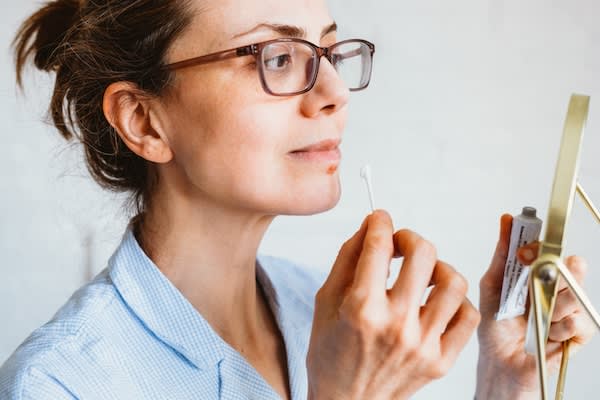Cold sores vs. canker sores

[7 MIN READ]
In this article:
-
Cold sores and canker sores are common, and people often use these terms interchangeably. But cold sores and canker sores are separate conditions with different causes, appearances and treatments.
-
Cold sores are most often caused by the herpes simplex virus, type 1. They form outside of the mouth and lips as a single blister or cluster of small blisters and are highly contagious.
-
Canker sores form on the insides of your cheeks, lips, tongue or roof of your mouth in a circle or oval shape, with a red rim and a white or yellow center. Their causes are unknown and they aren’t contagious.
Cold sores vs. canker sores
Cold sores and canker sores are both common, and more than one-half of the U.S. population has had them. They can affect anyone, and people often use these terms interchangeably. But cold sores and canker sores are separate conditions with different causes, appearances and treatments. We take a closer look here.
Cold sores: appearance, symptoms and causes
Cold sores, also called fever blisters, form outside of the mouth and lips, but can develop elsewhere on the face. They appear as a single blister or cluster of small blisters filled with fluid, typically in three stages:
- Burning or tingling occurs in the mouth before sores appear.
- Fluid-filled blisters develop in clusters.
- Blisters burst, ooze and scab over.
You may also have other symptoms when you get a cold sore, especially the first time it happens. These can include:
- Body aches and pains
- Fatigue
- Fever
- Headache
- Pain
- Swollen glands
Cold sores are most often caused by the herpes simplex virus, type 1 (HSV-1). Sometimes they’re called “oral herpes” or “herpes simplex cold sores.” It’s estimated that 90 percent of adults in the U.S. have been infected with the virus, although many never get cold sores or show any symptoms.
Managing cold sores and herpes virus
Because a virus is to blame, cold sores are highly contagious. ”HSV-1 spreads through close contact, such as kissing or sharing silverware, water bottles or personal items like lip balms or towels,” says Sunil Adwani, M.D., an internal medicine physician at Providence Manhattan Beach Primary Care. “You can transmit the virus even if you don’t have visible symptoms.”
Cold sores also can spread through oral sex. If you have cold sores and perform oral sex, your partner can develop genital herpes. Conversely, if your partner has cold sores and performs oral sex on you, you can get oral or genital herpes.
Genital herpes typically is caused by herpes simplex virus, type 2 (HSV-2) and spreads through sexual intercourse. But it’s possible to get it from a person who has HSV-1.
If you have cold sores, you can reduce the risk of spreading the virus to others by avoiding skin-to-skin contact, washing your hands often and not sharing personal items.
Some people have frequent recurrences of cold sores. Triggers of an outbreak can include:
- Certain foods
- Cosmetic surgery
- Dental work
- Exposure to sunlight
- Fever
- Hormone changes
- Illness such as a cold or the flu
- Injury to mouth or face
Treatment options
Cold sores typically go away on their own within a week or two, but contact your doctor if you haven’t had them before, Dr. Adwani recommends. “It’s a good idea to see your doctor the first time you get cold sores for a clear diagnosis and effective treatment plan.”
Also, call your doctor if your cold sores:
- Are very large
- Cause difficulty eating or drinking
- Don’t heal after two weeks
- Occur with a high fever
- Recur several times a year
Cold sores are commonly treated with prescribed antiviral medications, which can come in a tablet or cream. Depending on your symptoms and pain, your doctor also may recommend over-the-counter (OTC) ointments or gels for your mouth sores.
You can treat cold sores at home by applying a cold compress or ice to the blisters and taking an OTC pain reliever like ibuprofen. Don’t scratch or pick at the blisters, and try not to touch them. Wash your hands immediately if you touch them.
Reducing the frequency of outbreaks
There’s no cure for cold sores, and once you have the HSV-1 virus, it stays in your body for your lifetime. It can go dormant and then reactivate. That means you can get periodic flare-ups, especially if you’re exposed to triggers.
“For my patients who have recurring episodes of cold sores, I have them keep a supply of prescription antiviral tablets at home,” Dr. Adwani says. “They can take it either as a preventive medicine or at the first signs of an outbreak.”
Although cold sores can’t be prevented entirely, you can reduce the likelihood of outbreaks by limiting exposure to triggers, finding ways to manage your stress and washing your hands often.
What are canker sores?
While canker sores also affect your mouth, they’re different than cold sores. Canker sores form on the insides of your cheeks, lips, tongue or roof of your mouth. They’re a circle or oval shape, usually only a few millimeters, with a red border and a white or yellow center. People may call this a “canker sore mouth ulcer.”
The exact cause of canker sores is unknown, but doctors have identified a few potential triggers. “Canker sores may be due to a genetic tendency, trauma to the mouth, stress, or deficiencies in vitamin B12, iron or folate,” Dr. Adwani says. They also may be caused by hormones or an allergic reaction to foods, toothpaste or mouthwash.
This condition tends to affect children, adolescents and young adults more frequently and isn’t contagious. But these painful sores can irritate your mouth, Dr. Adwani adds.
Treating canker sores
Usually you can manage canker sores at home, and they go away on their own in 10 to 14 days. But like cold sores, when you get your first one, see your doctor for a confirmed diagnosis and treatment plan.
Also, contact your doctor if you have any of the following:
- Abdominal pain
- Canker sores that don’t go away after 14 days
- Eye discomfort
- Fatigue
- Fever
- Problems eating or drinking
- Rashes or other sores
Although there’s no cure for canker sores, treatment options can help reduce pain. These include:
- Gargling with a prescription steroid solution
- Rinsing your mouth with an OTC or prescription anesthetic solution
- Sucking on throat lozenges
- Taking OTC anti-inflammatories like ibuprofen
- Using a topical gel to protect against irritation
Like cold sores, canker sores can’t be cured and can come back. You can help prevent them by avoiding triggers, brushing and flossing your teeth, and getting regular dental check-ups.
Take care of your mouth
While cold sores and canker sores may be a nuisance, medical care and treatment can help resolve them so you feel better. Always contact your doctor if you have any questions or concerns.
Contributing caregiver

Sunil Adwani, M.D., is an internal medicine physician at Providence Manhattan Beach Primary Care in Manhattan Beach, California.
Find a doctor
If you are looking for a primary care provider, you can search for one who’s right for you in our provider directory.
Download the Providence app
It’s all in the app: easily stay connected with Providence and your health. With the Providence app, you can schedule appointments, have virtual visits from the comfort of your own home, get health recommendations personalized for you, access your health records and so much more. Learn more and download the app.
Related resources
Beyond brushing: Keeping a healthy mouth as you age
This information is not intended as a substitute for professional medical care. Always follow your health care professional’s instructions.


